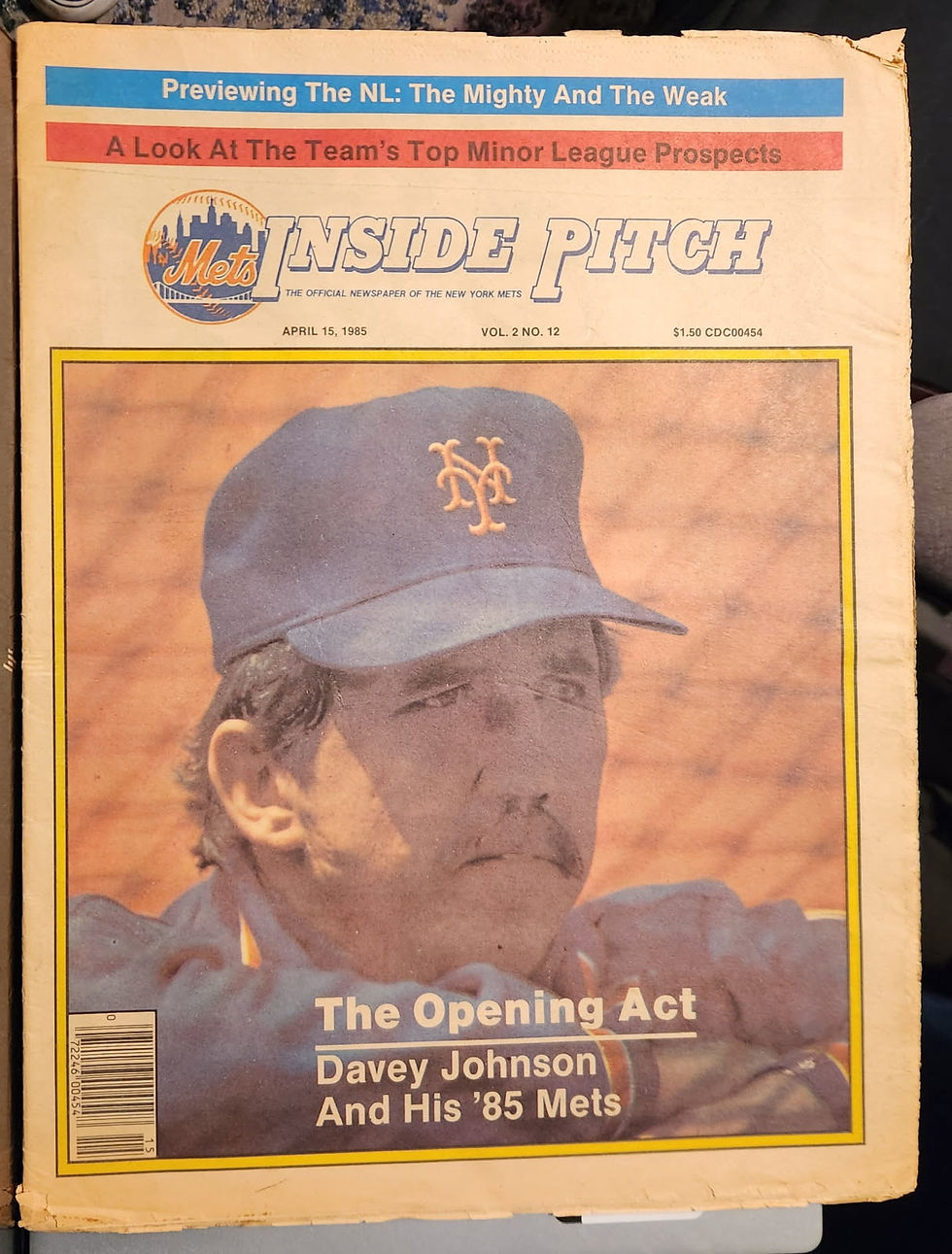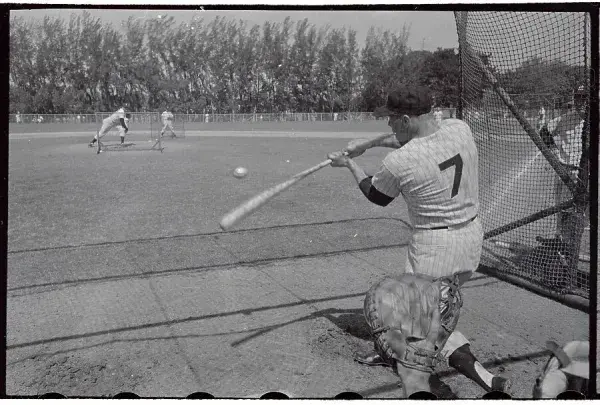Andy Esposito's One On One with Davey Johnson from 1985
- Mark Rosenman

- Sep 7, 2025
- 10 min read
Updated: Sep 8, 2025

Mets hearts are saddened by the loss of Davey Johnson at the age of 82. A great
manager, a great ballplayer, a pioneer in the then-unheralded field of analytics related to baseball, Johnson was a “Forrest Gump” of sorts in baseball, from being partially responsible for the Mets’ first World Championship in 1969 (he stroked the last fly ball out to Cleon Jones to close out the five-game World Series), to being the club’s skipper in 1986 when they won it again.
Johnson was also the last player to get a hit off Sandy Koufax in 1966, and he joined Hank Aaron and Darrell Evans in the Atlanta Braves’ lineup in 1973 as baseball’s first trio to slug at least 40 home runs in one season with his 43 longballs.

Johnson also spent a season with the Tokyo Giants (1975), and has the distinction of batting behind Japan’s most prolific slugger, Saddaharu Oh. So how many ballplayers can say they were in the same lineups with Aaron and Oh! Try that trivia question on your friends and you’ll be certain to win a lot of bar bets.
The four-time All-Star, three-time Gold-Glover (at second base), two-time World Serieschamp as a player (with the Orioles, 1966, ’70), and member of both the Mets and Orioles Halls of Fame, was a candidate for the Hall of Fame in Cooperstown several times but has not yet received enough support from four Veterans Committees to warrant inclusion with a plaque on the wall.
With a winning record helming four clubs (1,372-1,071, .561 winning percentage)
helming four clubs after his Mets years (Reds, Orioles, Dodgers, and Nationals), and as a two-time Manager of the Year, perhaps a future Veterans Committee will look more kindly at his career, but the rules in Cooperstown still prohibit considering members collectively for their entire contributions to the sport, only as either a player, or a manager. Hopefully, someday the HOF will introduce a collective category to warrant induction.
It also would have been nice if David Wright had given a shout-out to Davey for being an honorable Met who also wore the number 5 when it was retired in July for the all-time great Mets third baseman, as well as a tip of the cap to Ed Charles (another memorable 5 wearer for the club when they won in ’69), but that’s just a forethought and afterthought from a longtime Mets fan.
In 1985, I had the great pleasure of a one-on-one sit-down with Davey Johnson that I treasure to this day. It was during spring training, when the team was still occupying their ancient facilities in St. Petersburg.

I was a young reporter for Mets Inside Pitch, then “the official newspaper of the New York Mets.” That certainly made it easier for the team’s PR Director, Jay Horwitz (yes, he was on the case even then) to grant this aspiring journalist to request an interview with the team’s second-year manager.
It was early March. Remember, the team had just enjoyed a promising 1984 season under Johnson’s leadership at 90-72. The second-place Eastern Division finish was an amazing (pun-intended) 22-win increase over their 1983 output (68-94) under George Bamberger and Frank Howard. If Wild Cards were as plentiful as they are today, the team would have been a strong postseason presence, no doubt.
The Mets had yet to experience the difference Gary Carter was to add to the team,(having traded for the future Hall of Famer the previous December), Kevin Mitchell was still an unproven rookie, Ray Knight had been a Met for just one month at the end of the 1984 season (acquired in a trade with Houston), and Keith Hernandez was still feeling his way after his first full season as a Met.
So there I was on a sunny Florida morning, with my little cassette recorder and primitive wired microphone, and yes, obviously nervous about a meeting with the team’s skipper. Standing patiently outside the wooden barracks-like clubhouse (I think it was used as military barracks during WWII) I finally got the go-ahead to enter, and was pointed to the manager’s office, a very non-descript little room with a desk, couple of chairs, a bulletin board on the wall, and a lot of paperwork scattered about.
If I had thought about it, I might have been even more overwhelmed by the history this room witnessed, as it was likely the same manager’s office occupied by Casey Stengel in 1962 and all Mets managers subsequent to that, including Gil Hodges from 1968-72. And even prior to the Mets’ occupation, the same facilities served as home to the Mickey Mantle-Whitey Ford Yankees in the 1950s.

Davey was already behind the desk, and he said it was okay to close the door. So there we were. Me and him. Just him and me. Any apprehensions were quickly relieved and Davey couldn’t have been nicer.
With philosophies that are eternal, and prescient about his use of computer analysis,here, then, is the Q & A that was originally presented in the April 15, 1985 issue of Mets Inside Pitch.
INSIDE PITCH: Davey, last year’s ballclub was basically new to you and your staff.
This year, you’re more aware of everyone’s talent. How has this helped you prepare for the season?
DAVEY JOHNSON: Well, last year, it did take some time to learn what everyone was capable of, especially with the pitching staff. You know, I really had to revamp the pitching staff and I did with young arms. I felt they were ready and they proved me right. This year, they should be more comfortable, more consistent from Day One, know more about themselves and be able to put together a better season than last year.
IP: Are you looking to make any changes based on spring training?
DJ: I don’t believe jobs are won or lost in the spring, especially if you have a contending ballclub. There is some competition for jobs, but there’s only about two or three spots open. This causes everybody to be more relaxed. I’m not having to make as many changes, and that makes it easier for everyone to go about their work. And they’re not as concerned about one bad day affecting their chances of making the club.
IP: What exactly do you look for from some of the younger players in spring workouts and exhibition games?
DJ: You look to the conditioning of their arms and legs and batting timing, with
everybody, not just the younger players. Don’t try to burn them out. Don’t get them ready too soon. Take it easy. I’m not that concerned about winning in the spring as I am about their physical condition and coming out of spring training physically fit and mentally ready. On the hitter’s timing, some guys need more time than others. On pitcher’s arms, some guys need more time than others.
I’d like to point out that I like individuals on the ballclub to take care of Number One, and that’s themselves. Do what you have to do to get ready and don’t worry about anyone else. Let me fit it all together. If everybody plays up to their potential we can compete with anybody in baseball.
IP: When did last year’s team come together?
DJ: You know, you don’t like to release guys during the season, and I’m sure I won’t have to do that this season because we basically have a young ballclub, but I had to look at the ballclub last year and let go some veteran pitchers that weren’t doing the job. The bullpen solidified when I called up (Brent) Gaff and (Tom) Gorman from Tidewater. And the rotation came together when we got (Bruce) Berenyi and called up (Sid) Fernandez.
IP: Did anything about the success of last year’s team surprise you?
DJ: Again, the success of the team is in direct relationship with the pitching staff. Our young pitchers were more consistent early on than I thought they would be. I was expecting more erratic outings and I got more consistent outings. It was a learning experience. They should be more comfortable now going into the season and not use up as much energy as they did last year. They should finish stronger. Baseball is 162 games and it’s something you’ve got to grind out. You’ve got to want it more than the other guy. Nobody lays down for you in this game. It’s a game of how consistent you can be over the course of a season. If everybody works as hard as they have this spring during the season, we’re going to be just fine.
IP: What kind of difference is Gary Carter making to the pitching staff?
DJ: Well, pitching is confidence, and throwing to Carter is going to give the pitchers confidence, make them relax, and not overthrow.
You know with Gary they should be more confident about their pitch selection. He certainly knows the hitters around the league and can help them in tough situations. And I won’t have to be as concerned about that.
IP: The pitching staff appears set. Is it shaping up to your expectations?
DJ: All in all, they’ve all thrown well this spring. We’re going to start with a four-man rotation with (Dwight) Gooden, (Ron) Darling, Berenyi, and Fernandez. But certainly Eddie Lynch has pitched as well as anybody and I wouldn’t be against letting him start also.
IP: Last year, Dwight had an unusual amount of balks called and many runners stole bases on him. George Bamberger worked with him after last season. Has anything been done to alter Dwight’s move or delivery?
DJ: Dwight doesn’t have a balk move. We just worked on his move to first and making him a little quicker to home plate. Nothing major, just refining his talents a little more.
IP: What type of difference has Fernandez’s weight loss made in his performance so far?
DJ: Sid’s had much more mobility with his weight loss. He covers first much better and he’s got a better move to first. He works faster, which I like. All in all, he’s just a much better pitcher.
IP: Much has been made of your use of the computer. Are you programming
tendencies like a pro football would?
DJ: I use the computer in a lot of ways. It’s got a better memory than I do. If I want to use it to rest players, I want to know who’s been successful against a particular pitcher or vice versa. I want to know about certain pitchers against certain clubs or hitters, or in the relief corps or with my pinch-hitter. With my bench, I want to rest a player who could use a day off. I’ll rest him against a pitcher who’s particularly difficult for him in the past. But, I don’t rely that heavily on the computer. I like to see that we’re not machines. You
can’t just plug them in. Statistics has a standard deviation chart which says you need 1000 chances to predict within a plus or minus 5 percent. Now obviously only 10 or 20 at-bats against a particular pitcher is not going to make you some kind of genius on predicting who’s going to get a hit. So I (also) believe in hot hands and gut reactions. The computer is like a sixth coach for me. I also use it for some things that are really more classified that give me a better idea of what I’m up against.
IP: Do you foresee a possible future where computer terminals are installed in the dugout to give each manager access to scouting reports and other information?
DJ: No, not at this time or in the foreseeable future. But you never know. I guess it’s possible that computers could be used to a greater extent in the future.
IP: Did you use a computer in Tidewater?
DJ: No, not in the way I use it now. But I was getting the programs and software
prepared in Tidewater to eventually use in the big leagues.
IP: Is it true you used to ask (Orioles manager) Earl Weaver about some of the
decisions when you were a player in Baltimore, question his moves to determine his strategy?
DJ: Well, no one ever really questions Weaver’s decisions. Earl wasn’t necessarily always receptive to explaining why he did certain things but at times I would ask him and he would explain his strategy.
But not just with Weaver, with all the other managers I played for. You like to know certain things, know why they do things and what the reasoning is behind the decision. It was a learning experience for me. Playing for a number of managers, some things you don’t have to ask. You already understand why. You learn from whoever you play for, a Danny Ozark, an Eddie Matthews, or a Clyde King. Some things you like and some things you might not like.
The things you like you put into your own program if you get a chance to manage. Earl was probably the best manager I played for. I thought he handled pitchers very well.
IP: Is any member of this year’s or last year’s Mets team as inquisitive as you were, with possible managerial potential in the future?
DJ: No, I really haven’t noticed.
IP: Do you feel any urgency to break from Opening Day with a start like year’s Tigers?
HISTORICAL NOTE: The 1984 Detroit Tigers began their 1984 season 35-5.
DJ: Well, it’s true the games you win in April and May are just as important as the
games you win in September, and it’s great to get off to a good start, but you know the Cubs last year got off to a bad start and still won, so…if everybody stays healthy, I’ll take my chances. That’s all I’m concerned about.
IP: How do you pace yourself and the team over the course of the season?
DJ: I like to use all 25 players. They all contribute to a winning season and it’s just my job to keep the pulse beat in the clubhouse, on the planes, and know when a guy needs a rest and could use a day off. Don’t really abuse anybody or drain any pitcher. If I can do that, everyone will play better.
I like to compete. I think the key to any player is just learning about himself and learn about his strengths and weaknesses are. Don’t spend your time polishing your strengths. Believe that you are the guy that can do the job. Sometimes you have to remind yourself nobody else can do this. (Know) I can do it and I’m the only one who can do it.
IP: What do the computer readouts predict for this year?
DJ: Last year, I said if we stay close by June 1 st we’d have a chance to surprise a lot of people and we did. This year people are recognizing that we have some quality players here and now it’s just a matter of us going out to prove we are a good team. If we play up to our potential, I don’t see anybody in baseball that can stop us.
HISTORICAL NOTE: The 1985 Mets finished a positive 1985 season at 98-64, but fell
to second place to in the NL East to the St. Louis Cardinals.
RIP, Davey. And thank you.




This article was a great trip down memory lane! Very interesting and informative! Thanks for sharing and helping us remember Davey Johnson
Great article and retrospective, Mr. Esposito! I was a big fan of Davey Johnson long before he was associated with the Mets. His passing hits home. I loved him as a key player on one the best teams since WWII, the 1960s-1970s Orioles. He was not the biggest gun (How can you be when you have Frank Robinson and Boog Powell in your line up and later on Bobby Grich and Don Baylor?). He was an exceptional fielder who won 3 Golden Gloves on a team theat excelled ondefense. He was the only Golden Glove or necessarily the best GG (How can you be when you have all time great defenders Brooks Robinson and Luis Aparicio, plus the incomparable P…
RIP Davey Johnson. This is a great interview, talking about "the computer" as if it were some strange object (which it was back then). Thanks for reminding me about #5, Ed Charles was one of my favorites in '69. I agree about Cooperstown too!